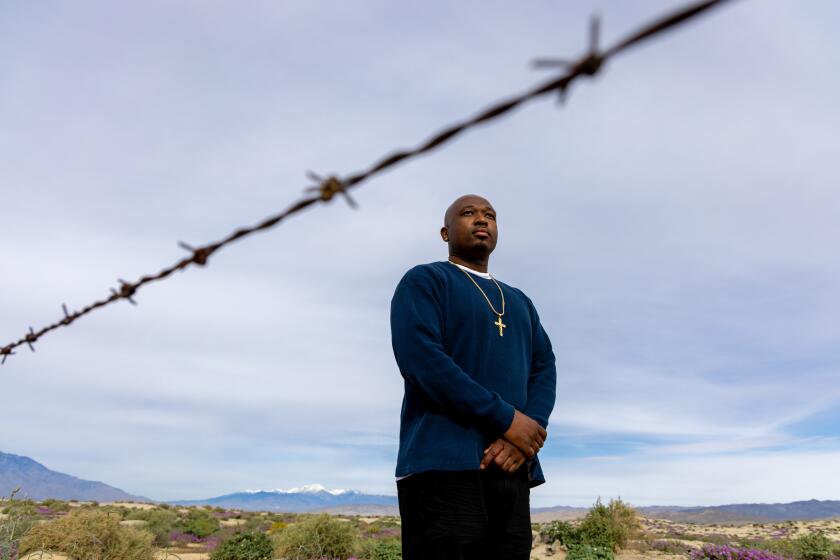Jerry Pacht; L.A. Judge, Member of Judicial Commission
Jerry Pacht, Los Angeles judge for two decades known for his evenhanded, levelheaded and courageous decisions on constitutional law, has died. He was 75.
Pacht died Tuesday at St. John’s Medical Center in Santa Monica of a cerebral hemorrhage, his wife, Judith, said Thursday.
Revered by lawyers, the news media and the public for his wit as well as his wisdom, Pacht served many years on the statewide Commission on Judicial Qualifications, which reviews complaints about judges’ behavior. As a member of that body, he participated in an unprecedented public examination of the workings of the California Supreme Court in 1979, a duty he later termed “shattering.”
The son of a judge, Pacht was candid about courting appointment to the bench. “I’m not into making money,” he told The Times in 1980. “I always wanted to make some kind of mark, to change my society, do something to make it run better and had concern for people who had limited power or resources--the little people.”
Pacht was named to the Los Angeles Municipal Court in 1965 by Gov. Edmund G. “Pat” Brown Sr. and lost no time in earning national attention with a prescient decision. Dismissing charges of public drunkenness, he ruled that habitual intoxication or alcoholism is a disease and not a crime.
He was overruled by appellate courts at that time, but Pacht proudly noted that his ruling influenced legislation to set up detoxification centers and was reprinted in the Congressional Record.
Pacht was quickly elevated to the Los Angeles County Superior Court by Brown in 1966. The judge’s most famous of more than 135 decisions struck down a 29-year-old UC policy prohibiting the hiring of Communists. His ruling prevented the university from firing UCLA philosophy professor Angela Davis.
The controversial decision, upheld by appellate judges, prompted a recall effort by an assemblyman who called Pacht a “left-wing bigot.” The recall failed to get on the ballot for lack of adequate signatures.
Pacht personally considered far more significant his decision invalidating a 90-year-old “claim and delivery” law. The statute permitted law enforcement agencies to seize personal property when installment debtors fell behind on payments. Pacht said the law unconstitutionally failed to give the debtor his day in court before the seizure.
The judge, who as a private litigation lawyer had specialized in publishing and entertainment issues, also ruled in favor of The Times’ right to caricature former Los Angeles Mayor Sam Yorty during the mayor’s election campaign. Pacht’s sanction of the political cartoon as justified freedom of the press under the 1st Amendment was upheld by the U.S. Supreme Court.
Although the civil rights case was settled before trial, Pacht’s assignment to preside over an American Civil Liberties Union case against the Los Angeles Police Department also earned him headlines. He found himself the subject of a file kept by the department’s intelligence unit, the Public Disorder Intelligence Division. Notes on the file suggested that Pacht had “possible bias” against intelligence gathering by police. When told about the file, Pacht belittled it as “an outrageous waste of public money.”
Unlike most judges who shy away from the terms, Pacht gleefully admitted to being a “liberal” and an “activist.” Before taking the bench, he headed the Los Angeles County Democratic Central Committee and ran twice unsuccessfully for Congress. He headed the ACLU’s legal committee and described himself as “probably the only white man who was the head of the NAACP’s legal defense fund.”
Yet Pacht was a stickler for upholding existing law even if he disagreed with it.
“You’ve got to have a sense of what the law is and in some cases what the law ought to be. . . ,” was how he summed up his judicial philosophy for the Daily Journal legal newspaper in 1982. “I found something to be true, which is if you do what you think is fair, most of the time, you’re going to be right on the law, because the law is not an ass. . . . Basically the law is based on common sense, and when it’s not, maybe somebody ought to do something about it.”
Born in Los Angeles, Pacht attended public schools, earned a bachelor’s degree at UCLA and worked briefly at Metro-Goldwyn-Mayer before serving as a lieutenant in the Army in World War II. Afterward, he abandoned visions of becoming a singer to earn a law degree at USC.
He remained a lifelong fan of music, however, and was delighted to be asked to sing the national anthem at Dodger Stadium. “Thirty-thousand people cheered,” he later reported, “. . . for the Dodgers who entered the stadium.”
After retiring from the bench, Pacht continued a nearly full schedule of cases as a private judge, commonly called a rent-a-judge. He also contributed book reviews and letters to the editor on judicial subjects to The Times.
In addition to his wife, Pacht is survived by his daughter, Jane Monson; two sons, Robert Pacht and Jonathan Siegel; a brother, Rudolph Pacht; a sister, Patricia Snitzer; and one granddaughter, Jessica Siegel.
Memorial services are scheduled for 2 p.m. April 27 at the UCLA Faculty Center.
The family has asked that donations be made to the Jerry Pacht Memorial Scholarship Fund at UCLA, Box 951476, Los Angeles, CA 90095-1476, for the most outstanding student in constitutional law, or to the Nature Conservancy, Attention MSC, 1815 N. Lynn St., Arlington, VA 22209.
Start your day right
Sign up for Essential California for news, features and recommendations from the L.A. Times and beyond in your inbox six days a week.
You may occasionally receive promotional content from the Los Angeles Times.



